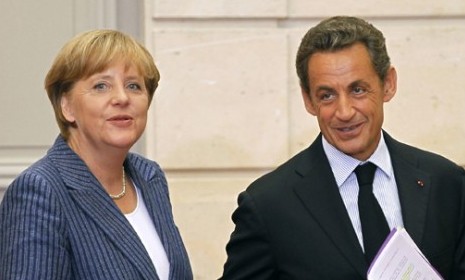Would a eurozone government calm the markets?
German and French leaders say setting common budget and tax policies will help end Europe's debt crisis. But jittery investors appear skeptical

A free daily email with the biggest news stories of the day – and the best features from TheWeek.com
You are now subscribed
Your newsletter sign-up was successful
The leaders of France and Germany have come up with a new proposal to resolve Europe's debt crisis: Creating a "true European economic government" to coordinate fiscal policy, and shore up governments teetering on the brink of insolvency. German Chancellor Angela Merkel said after an emergency meeting with French President Nicolas Sarkozy that the move would put all eurozone nations on firmer financial footing and restore "lost confidence." But skeptics said the proposal amounted to well-intentioned window dressing, not the "silver bullet" needed to end the spiraling crisis. Would the plan do any real good?
No, these tired ideas will not help: "It's not surprising that investors gave a lukewarm reaction," says Bernd Radowitz at The Wall Street Journal, with European stocks falling as soon as investors got a chance to digest the recycled ideas Merkel and Sarkozy floated. Their proposal to push eurozone nations to amend their constitutions to require balanced budgets, for example, has already been shot down, and was only resurrected to appease Germans tired of paying for "their neighbors’ fiscal sins."
"Merkel and Sarkozy recycle old ideas"
The Week
Escape your echo chamber. Get the facts behind the news, plus analysis from multiple perspectives.

Sign up for The Week's Free Newsletters
From our morning news briefing to a weekly Good News Newsletter, get the best of The Week delivered directly to your inbox.
From our morning news briefing to a weekly Good News Newsletter, get the best of The Week delivered directly to your inbox.
This is a start, but not be enough: It's encouraging that Germany and France recognize that "disparate fiscal policies within the euro zone are sowing the seeds of its destruction," says Mike Peacock at Reuters, but simply laying the groundwork for further integration won't resolve the region's debt crisis. Jittery investors want to see a larger rescue fund for countries on the brink of insolvency, or common euro bonds, which might be the only way for distressed nations to borrow money at affordable rates.
"Analysis: France, Germany set out next stage of EU integration"
Terrific idea. Good luck implementing it, though: "On the surface, it sounds very bold, a federal 'eurozone,'" says David Gilmore of Foreign Exchange Analytics, as quoted by the Associated Press. Forging a deeper fiscal union among the 17 countries that use the euro is undeniably what "made the euro credible." But pushing that to the next level by getting those governments to let a new government body set their tax and budget policies might turn out to be a "pipe dream."
"Merkel, Sarkozy propose eurozone government"
A free daily email with the biggest news stories of the day – and the best features from TheWeek.com
-
 How the FCC’s ‘equal time’ rule works
How the FCC’s ‘equal time’ rule worksIn the Spotlight The law is at the heart of the Colbert-CBS conflict
-
 What is the endgame in the DHS shutdown?
What is the endgame in the DHS shutdown?Today’s Big Question Democrats want to rein in ICE’s immigration crackdown
-
 ‘Poor time management isn’t just an inconvenience’
‘Poor time management isn’t just an inconvenience’Instant Opinion Opinion, comment and editorials of the day